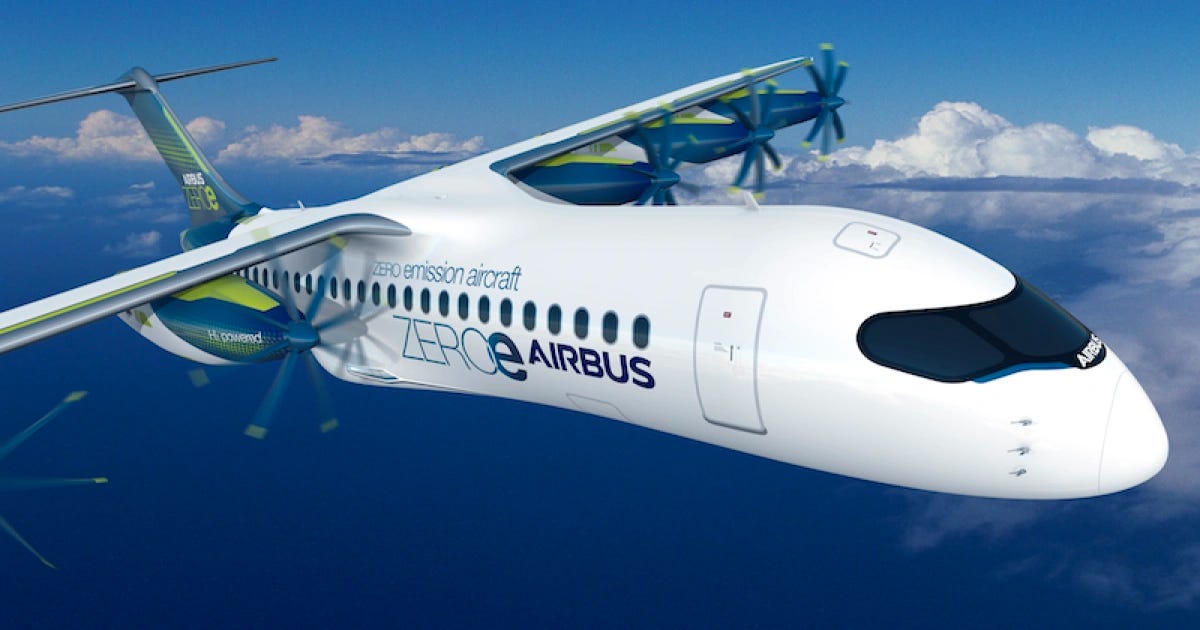#Sustainability20: Airbus Aiming Hydrogen-Fuelled Aircraft At 'Low End' Of Market & More
Weekly Roundup - 16/02/24
Each Friday, we publish a round-up of the 20 most important stories on sustainable aviation. You can see previous editions of #Sustainability20 here.
Industry Updates
With sustainability front of mind, SITA's 2023 Air Transport IT Insights report reveals how airlines prioritise the renewal of their fleets, efficiencies around aircraft turnaround and ground operations, and a commitment to Sustainable Aviation Fuel (SAF).
United Airlines has expanded its Sustainable Flight Fund with new partners, including Aircastle, Air New Zealand, Embraer, Google, HIS, Natixis Corporate & Investment Banking, Safran Corporate Ventures, and Technip Energies, bringing total capital commitments to over $200 million.
CLIMATE WATCH: World's first year-long breach of key 1.5C warming limit - BBC
Global warming has surpassed 1.5°C for the first time over an entire year, marking a concerning milestone despite not violating the Paris Agreement. Urgent carbon emissions cuts are needed to mitigate impacts.
Infrastructure and operational efficiencies
Changi Airport will house Singapore's largest single-site rooftop solar panel system by early 2025. Changi Airport Group has partnered with Keppel for a 25-year project to install a 43 MWp solar PV system across terminal and airfield rooftops.
British Airways is transitioning to digital maintenance logs, known as E-Logs, saving over 900,000 pieces of paper annually. This switch expedites engineering procedures by providing real-time data for faster troubleshooting and proactive maintenance.
Auckland Airport in New Zealand is prioritising sustainability by diverting waste from landfills and converting it into organic compost. Initiatives include reducing waste sent to landfills and collecting food waste, with 13.5 tonnes diverted in three months.
KLM uses the TRAYS AI model, launched by Kickstart AI, to predict the number of meals required on board. This reduces food waste by up to 63%, saving over 100,000 kg of meals annually.
Qantas is retrofitting 23 aircraft in Brisbane with new winglets. The installation will take over 400 hours per plane and extend until 2026, aiming to save 8,000 tonnes of CO2 emissions.
Sustainable Aviation Fuel (SAF)
As global SAF supply limitations pose challenges, one UAE official stresses the urgency for Gulf countries to produce SAF to support their airlines and compete in the market.
Velocys, a UK-based aviation fuel company, received $40 million from investors to advance its SAF technology. Unlike other SAF processes, Velocys' technology boasts flexibility and scalability, making it adaptable to various feedstock options and production capacities.
New technology: Electric and Hydrogen
Airbus plans to introduce a hydrogen-powered aircraft by 2035, likely targeting the lower end of the market initially to avoid competition with existing models. The company emphasises the need for progress in certification, operational, and regulatory frameworks.
Cali startup delivers first electric cargo plane for US Air Force with up to 200 mi range - Electrek
Silicon Valley startup Pyka delivered its first electric autonomous cargo plane to AFWERX, part of the US Air Force, expanding from crop spraying to large cargo aircraft production.
The US Air Force's Agility Prime program is testing battery-powered VTOL aircraft in the California desert, aiming for small, versatile, and cost-effective aircraft for flexible wartime operations.
HNO International, with partners Element One Energy and Pneumatic and Hydraulic Company, is building the world's first 500kg/day green hydrogen production facility in Houston, Texas. Scheduled for completion in Q2 2024, it aims to serve various industries, including civil aviation.
The FAA has approved Joby Aviation's certification plan for its eVTOL aircraft's electric propulsion system, marking a significant step toward commercialisation. Joby's plan covers various components, including motors, gearboxes, and propellers.
Lilium announces Orlando International Airport (MCO) as the hub for its eVTOL air services in central Florida. The six-passenger Lilium Jet will operate from a new vertiport, part of the company's expansion plans in the state.
Dubai partners with Joby and Skyports to introduce the world's first air taxi service. Joby will provide eVTOL aircraft, while Skyports will build vertiports. Services may commence as early as next year.
The HEROPS program, initiated in mid-January, aims to develop a hydrogen-electric propulsion system for regional aircraft, led by MTU Aero Engines. The project will build a ground demonstrator with 1.2 megawatts of power to prove feasibility and scalability.
Leveraging ArianeGroup's expertise in hydrogen fuels, Turbotech and Safran successfully conducted the first test of a hydrogen-fueled aero gas turbine engine. The trial demonstrated the potential for future aircraft propulsion systems.
Swiss explorer Bertrand Piccard unveils Climate Pulse, an emission-free project featuring a green hydrogen-powered airplane for a non-stop global flight. Syensqo and composites engineer Raphaël Dinelli are key partners in the venture.
Swiss manufacturer Sirius has partnered with Indian operator MEHAIR in a $400m deal for 50 hydrogen VTOL aircraft, with options for 50 more. Assembly, powertrain integration, and infrastructure development are key components.










